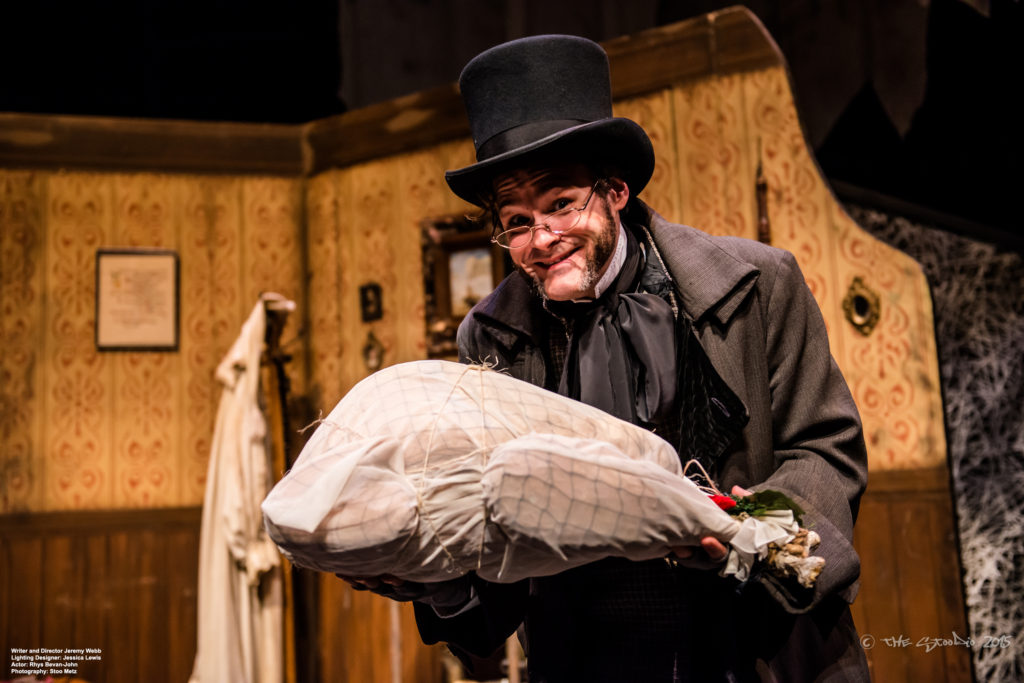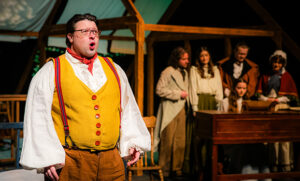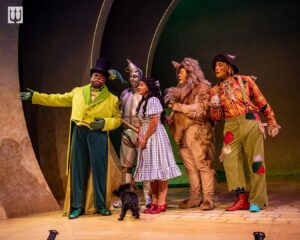
In December, 2003 Jeremy Webb brought his own unique adaptation of A Christmas Carol to the Neptune Theatre Studio for the very first time. Three years earlier Webb played Bob Cratchit to Nigel Bennett’s Scrooge in Warren Graves’ adaptation of the Dickens classic, which played on the Neptune Main Stage, directed by the late Jean Morpurgo. In this new adaptation Webb not only played Scrooge and Cratchit, but also nearly all the other characters in the story as well. In 2003 Rhys Bevan-John and Bill Wood joined Webb in the creation of this work, as the puppeteers who bring Jacob Marley and the Ghosts of Christmas Past and Future to life. Webb brought this show back to Neptune’s Studio year after year, and toured it to theatres around the province and beyond. In 2015 Webb passed the torch to Bevan-John, who has been bringing these iconic characters to life for the last four Christmases under the direction of Webb, and with Simon Henderson (who toured with Webb for years in Shakespeare on Trial) as the puppeteer. Bevan-John and Henderson sat down with me at the Studio Theatre to chat about their love for this story, and their experience creating this Dickensian world each year.
Charles Dickens wrote A Christmas Carol in 1843 about a wealthy man, Ebenezer Scrooge, who has spent most of his life railing against charity, generosity, and caring about anyone but himself, but who realizes the perils of this kind of Individualism when he is forced to look back at the choices that have brought him to this point in his life. Bevan-John explains, “I love doing this show because it’s a story about a guy who sacrificed everything in order to win at Capitalism. And he then, through the story, realizes, ‘Oh, everything I sacrificed in order to win Capitalism means that I lost life. The thing that I thought was the important thing is not actually the important thing now.’ It’s a really wonderful thing to get to be a vessel for that narrative and for that moral. Scrooge, like all of us, just sort of does what he’s told, and I think we are kind of told, we have this idea like, ‘more money more better,’ and he does whatever he needs to do in order to make sure that he gets out on top, and to make sure he’s number one, and it just leaves him really lonely. But also too, like a lot of us, he justifies his state. One of my mom’s favourite song lyrics is, ‘I’ve been down so long, it looks like up to me.’ I think we all can do that too, ignore the unfortunate situation that we’re in, but then once Scrooge is presented with all of the moments of his life that, added up, made him who he was, he really sees the tragedy of his life and the tragedy of the outcome of his life.”
At a time when activists around the world are calling for the billionaire class to pay its fair share and for governments to invest more in social and community programs that benefit everyone Dickens’ 176 year old story seems more relevant then ever.
“I think one of the reasons why [the story] has staying power and that people will come back year after year and watch our show, or they will watch Mickey’s Christmas Carol, or they’ll watch The Muppet Christmas Carol, or they’ll watch Alastair Sim every single Christmas, or they’ll read the book to their children, is because it’s timeless,” says Henderson, “We all know the idea of someone being greedy, and the idea that someone can be too greedy, and that your greed can take you down roads and down pathways in your life that are ultimately destructive to those around you and to yourself… we all know that. So, it’s having that reinforced. It’s remembering that, ‘hey look, there might be another way to do things.’ ‘Hey, look, maybe kindness is more important than being right, even.’ It’s a lesson that we all need to re-learn too. That’s okay. It’s okay that you can go, ‘oh, yeah, right, I forgot, I’ve been so focused on getting this job done, this project or whatever, that I’ve been blind to the things around me, and the people around me’, you watch this play and you get a little bump and you go, ‘Oh! Right! Oh. Right. I can reset.’ and that’s okay. We are human. We aren’t perfect. We will always fail and always need something to show us that we’ve failed, and we always need forgiveness, and a chance to be redeemed. That’s our cycle, and that’s what this show does, that’s why it is timeless.”
It’s also powerful to see Scrooge be confronted by the error of his ways and to choose to dramatically change his life for the better. Scrooge doesn’t deny the facts the ghosts present him with. He doesn’t scream, “FAKE NEWS!” at them and double down, stubbornly clinging to his mistakes. He doesn’t bend over backwards trying to change the perspective through lies and manipulation until he sees the version of his life he wants to see. Scrooge has the strength of character to take the opportunity he is given to grow, and he ends up exceeding everyone’s expectations of how much kindness, generosity, Christmas spirit, and love he is able to give to those around him for the rest of his life.
“There is that potential [for forgiveness],” says Henderson, although he adds that the part of the story that really hits him in its poignancy is that for Scrooge the loss of his one love, Belle, is irreversible. “That’s the one thing about this [story], even though he’s able to bounce back, as a character, he’s able to renew his relationship with his nephew, and build a relationship with the people that he works with, there’s one little element that I’m like ‘Ugh. Oh. Wow.’ Realistically, it shows that there’s always some kind of consequence [for longterm selfishness and greed]. Life isn’t perfect. Things can be made better, but it doesn’t mean that you get everything back. You might have to accept that you did actually lose something important, [but then you need to be able to] forgive yourself and dive into being reset.”
Since A Christmas Carol is a nostalgic holiday tradition for so many folks, sometimes audience members come into the theatre with high expectations for Bevan-John. He spoke of a woman who billeted him in Shelburne whose father had read the novella to her and her family every year when she was a child. After the show she told him that her initial perception was that there was no way he was going to be able to bring the richness of the story to life all by himself. But, Bevan-John recounts, “by the end she was like, ‘I want to billet him specifically,’ and she was like, ‘That was so special. That was so wonderful.’ Then she told me the story [of how much the story meant to her] and that she thought that I had done it justice, as far as she was concerned, and she had some pretty high expectations…. that was a really nice moment.”
The puppets add an important element to the show as well, but Henderson points out, Bevan-John is instrumental in making this magic come to life, “I’m paying very much attention to what I’m doing and what the puppet is doing, so i have very little idea of what it looks like from the outside, or what it’s like to interact with a puppet,” explains Henderson, “I think I can give them some kind of life, but at the same time, it’s what Rhys does with them, it’s how he interacts with them, it’s how he, also, by giving them his attention, he helps makes them live. I’m not out there on my own kind of swinging a mannequin around,” he adds, to a huge guffaw from Bevan-John, “Rhys and I are working together when I am onstage, and I’m really grateful for that.” Adding to the magic is the freedom with this adaptation to take liberties with the script, to interact with audience members, and to improvise within the framework of the story. Bevan-John says, “Something that I’m always saying now, because I like to hear it, is when we work in the theatre it’s not called a work, it’s called a play. I do my best to stay as playful as possible with the material and not get the sense that there’s a ‘right’ way to do it, and, of course, I’ve done a lot of improv over the years, and you know when the right time is- there’s space in this moment to kind of comment on the thing that’s just happened in the room. Honestly, I feel really, really lucky that I’m in a play that allows for that, because theatre, once you get to professional theatre, it really becomes quite ‘Type A,’ and you just want to get it the right way, the way it’s ‘supposed to be’ and do it the exact same way every night, and I think that that is super-duper important, but I think the pendulum can swing too far in that direction, and at the cost of the feeling of what is really special about theatre: the spontaneity and the playfulness and the fun. I love being able to throw an ad lib in there, and too, there’s the audience member that we pull up [on stage] every night and that’s always different. I love it.”
Both Henderson and Bevan-John love this story, which is what makes them both such ideal performers for this show. Bevan-John says, “I watch either or both Bill Murray’s Scrooged and Alastair Sims, those are my two favourite ones, and I love Mickey’s Christmas Carol too. It’s a really tight version. 29 minutes. I love that one a lot. ‘WHY IT’S YOU, EBENEZER!’ he booms in a perfect impression of Pete as The Ghost of Christmas Future, “THE RICHEST MAN IN THE CEMETERY!” Henderson laughs joyfully, “I remember being terrified of that scene,” Bevan-John says, “Scrooge is falling into the grave, and it’s opening up, and it’s on fire, and he’s holding onto the roots…”“Back when Disney would scare the pants off children,” adds Henderson.
“I have listened to a number of different audiobook versions,” Bevan-John adds, “There’s an unabridged version that Tim Curry does. There’s also another one I’m very fond of, Dickens was like the ‘Christmas Guy,’ and he would do public readings of the story every Christmas- he was like Jeremy, he just went and did tours for years and years. He edited his own story, he abridged it- and the New York Library actually has his prompt copy- basically he cut up a published version of it and then pasted those into a bigger book, and he would strike things out and edit it, which you can look at online. The recording is online too- there’s a version of Neil Gaiman reading from Dickens’ prompt copy at the New York Library. I’m very pleased, the edits that we have done are, inadvertently, very similar to the ones that Dickens did, and, of course, the things that he has that we don’t, it’s because we are doing a live version of it- a theatrical version. I often listen to the Tim Curry and the Neil Gaiman version at least once a year now. I genuinely enjoy the story. It sounds absurd that I would go home from having performed the play and then listen to the story again. But it’s kind of nice to have someone else tell me the story.” Henderson agrees, “I watch Alastair Sims’ Christmas Carol every year, after we have JUST done it, after I have just heard you tell it,” he gestures to Bevan-John, “I’m like, ‘tell it to me again?’
Rhys Bevan-John and Simon Henderson tell the story of Dickens’ classic A Christmas Carol at Neptune Theatre’s Scotiabank Studio until December 28th.
A Christmas Carol plays at Neptune Theatre Scotiabank Studio (1593 Argyle Street, Halifax) now until December 28th, 2019. Performances are Tuesday to Friday at 7:30pm and Saturday and Sunday at 2:00pm and 7:30pm. There is No Evening Performance: Sunday, December 15th and No Performances on Wednesday, December 25th. There are Additional Daytime Performances: Tuesday, December 24th and Thursday, December 26th. For tickets please visit THIS WEBSITE, or the Box Office at 1593 Argyle Street or phone 902.429.7070.
You can follow Neptune Theatre on Social Media: Facebook. Twitter. Instagram (@NeptuneTheatre).








